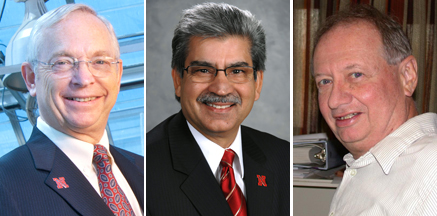
Two professors and a vice chancellor at UNL have been named Charter Fellows of the National Academy of Inventors: Brian Larkins, associate vice chancellor for life sciences and professor of agronomy and horticulture; Prem S. Paul, vice chancellor for Research and Economic Development; and James Van Etten, William Allington Distinguished Professor of Plant Pathology and co-director of the Nebraska Center for Virology. All are part of the group of 98 innovators elected to NAI Fellow status.
Election to NAI Fellows is a high professional distinction accorded to academic inventors who have demonstrated a highly prolific spirit of innovation in creating or facilitating outstanding inventions that have made a tangible impact on quality of life, economic development, and the welfare of society. The fellows were announced Dec. 18.
The 98 innovators elected to NAI Fellow status represent 54 universities and nonprofit research institutes. Together, they hold more than 3,200 U.S. patents.
Included in the charter class are eight Nobel Laureates, two fellows of the Royal Society, 12 presidents of research universities and nonprofit research institutes, 50 members of the National Academies (National Academy of Sciences, National Academy of Engineering, Institute of Medicine), 11 inductees of the National Inventors Hall of Fame, three recipients of the National Medal of Technology and Innovation, four recipients of the National Medal of Science, and 29 AAAS Fellows, among other awards and distinctions.
Academic inventors and innovators elected to the rank of NAI Charter Fellow were nominated by their peers for outstanding contributions to innovation in areas such as patents and licensing, innovative discovery and technology, significant impact on society, and support and enhancement of innovation.
An internationally recognized leader in the development of plant molecular biology and plant agricultural biotechnology, Larkins focuses his research on the regulation of seed development and the synthesis of seed storage proteins. Larkins uses a molecular genetic approach to investigate the biology of seed storage protein synthesis and seed development, particularly in corn and other cereal grains. Larkins' research on the nutritional quality of corn and other cereal grains has significant implications for improving nutrition for humans and livestock. His work has led to scientific advances, including new molecular biology techniques and a broader understanding of the molecular mechanisms that regulate seed development and protein production in corn seeds. Larkins was elected to the National Academy of Sciences in 1996.
Paul has been vice chancellor for research and economic development at UNL since July 1, 2001. During Paul's tenure at UNL, research funding has more than doubled. During his career, he has received more than $21 million in grants for research, training and facilities, and has published more than 100 papers in refereed journals as well as numerous books, book chapters and review articles. He has received several awards for his research and leadership including election as a fellow in the American Association for the Advancement of Sciences and the Pfizer award for research excellence. Before joining UNL, Paul spent 16 years on the faculty at Iowa State University and earlier was the veterinary medical officer at the U.S. Department of Agriculture's National Animal Disease Center in Ames, Iowa, for seven years. Paul's research interests are in viral pathogenesis -- specifically swine enteric, respiratory and reproductive viruses and study of public health risk of swine viruses through xenotransplantation. He has 21 patents on swine viruses and methods for protection against them.
Van Etten's research has focused on the isolation and characterization of large icosahedral, dsDNA-containing viruses that infect certain unicellular, eukaryotic chlorella-like green algae. These viruses (family Phycodnaviridae), which were discovered by Van Etten and a colleague in 1981, exist in fresh water around the world and are either the smallest or among the smallest proteins of their class. These proteins serve as models for mechanistic and structural studies and are thought to have a long evolutionary history, possibly more than a billion years. Studies on these viruses are revealing interesting aspects about the evolution of genes and genomes. Van Etten was elected to membership in the National Academy of Sciences in 2003.
Dean Sicking was also selected as a charter NAI Fellow. Sicking, a longtime UNL civil engineering professor, recently left UNL for the University of Alabama at Birmingham where he is associate vice president of product development and professor in the School of Engineering.
The NAI Charter Fellows will be inducted by the U.S. commissioner for patents, Margaret A. Focarino of the U.S. Patent and Trademark Office, during the second annual Conference of the National Academy of Inventors Feb. 22 in Tampa, Fla.
A complete list of charter fellows can be accessed at http://www.academyofinventors.org/charter-fellows.asp.
- Kelly Bartling, University Communications